
What’s the Best for Self-Defense? Comparing .380 vs 9mm
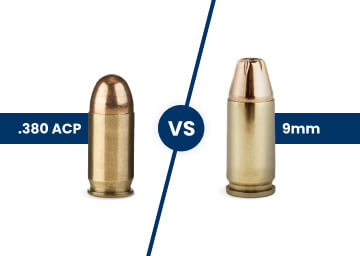
Looking to find the perfect handgun cartridge? Caught in the crossfire between the compact .380 ACP and the versatile 9mm? Look no further! Our complete comparison takes these two popular cartridges head-to-head, examining their performance, cost, recoil, and usage.Whether you're a new shooter looking for ease and comfort or a seasoned enthusiast seeking power and velocity, we've got the rundown to help you make an informed decision.
Key Takeaways
- .380 vs 9mm: What You Should Know: Both cartridges have the same bullet diameter, but the 9mm has a higher case capacity and offers higher velocity and energy, making it more powerful but with more recoil.
- .380 vs 9mm: Which Is the Superior Cartridge? The 9mm has higher stopping power and cost-effective ammunition, making it a favorite for both self-defense and professional use. The .380 is preferred for its reduced recoil and concealability.
- .380 vs 9mm: Pros and Cons: The .380 is smaller and offers reduced recoil but less stopping power. The 9mm provides higher stopping power and lower ammunition costs.
- Which One Should You Choose? The 9mm is a great all-around choice for those who can benefit from increased firepower, while the .380 is a good choice for those new to shooting or sensitive to recoil.
.380 vs 9mm: What You Should Know
There are a few key differences between the .380 (also called the 380 ACP) and the 9mm. This chart compares the measurements of these cartridges.
| .380 vs 9mm Measurements | ||
|---|---|---|
| Category | .380 | 9mm |
| Bullet Diameter | .355 in. / 9.017 mm | .355 in. / 9.017 mm |
| Case Length | .680 in. / 17.272 mm | .754 in. / 19.152 mm |
| Overall Length | .984 in. / 24.994 mm | 1.169 in. / 29.692 mm |
| Case Capacity | 11.8 grains H2O | 13.30 grains H2O |
| Expansion | 0.5-0.7 in. | 0.35-0.72 in. |
The actual performance of these cartridges can vary based on specific loads and individual firearm characteristics. The choice between .380 ACP and 9mm often depends on factors such as personal preference, intended use (self-defense, competition, or target shooting), and the characteristics of the firearm being used. You can test both at the range before making a decision to purchase.
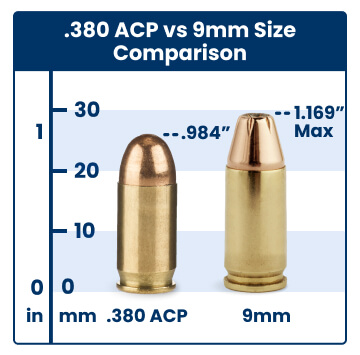
.380 vs 9mm: Which Is the Superior Cartridge?
Let’s discuss the major factors when deciding which cartridge is superior. There are a few top points for each to consider.
.380: Top Points
Control: The .380 ACP has reduced recoil and less stopping power than the 9mm. Less recoil benefits shooters looking for easier control in close-range self-defense situations.
Concealed carry: The .380 ACP's compact size makes these pistols an excellent option for concealed carry. Firearms for the .380 allow for easy concealment without sacrificing magazine capacity.
Ammo prices: The .380 ACP ammunition tends to be more pricey than 9mm due to lower supply. Fortunately, .380-chambered firearms are generally cheaper than 9mm.
9mm: Top Points
Stopping power: The 9mm offers higher maximum velocity, energy, and stopping power than the .380 ACP. The 9mm's popularity has led to a higher production volume and cheaper ammunition.
Recoil: While 9mm has more power behind it than the .380 ACP, it comes with a bit more recoil. Higher recoil can affect rapid-fire accuracy but is manageable with training and proper technique.
Availability: A broad selection of 9mm pistols is available for every type of shooter, from compact models for concealed carry to full-size models for duty use. Its widespread popularity and availability make it a more economical choice for regular use.
| .380 vs 9mm: A Comparison | ||
|---|---|---|
| Category | .380 | 9mm |
| Velocity | Max ~1000 fps | Max ~1200 fps |
| Cost | Higher ammo cost; cheaper firearms | Lower ammo cost; more expensive firearms |
| Trajectory | More pronounced bullet drop over distance due to lower velocity | Flatter trajectory due to higher velocity |
| Recoil | Less: ~3 ft-lbs | More: 4-8 ft-lbs |
| Usage | Preferred for concealed carry and civilian self-defense; backup for law enforcement | Widely used by law enforcement, military, and for civilian self-defense; suitable for a range of shooting activities |
| Muzzle Energy | 200-300 ft-lbs (depending on bullet grain) | 300-400 ft-lbs (depending on bullet grain) |
| Bullet Weight | 50-100 grains | 65-150 grains |
Velocity
The max velocity for the .380 ACP is around 1000 fps. Its performance is about 40% lower than 9mm, which may be preferred for ease of handling.
The 9mm has a max velocity of around 1200 fps, leading to a significant power advantage, however, the stronger recoil may affect the ease of rapid-fire. It is preferred in law enforcement, military, and civilian use for its stopping power and versatility.
Cost
Ammunition for the .380 ACP more expensive because of limited production. However, entry-level pistols under $200, making this cost-effective at initial purchase.
9mm rounds are more affordable and widely available. The pistols do have a higher initial cost, but you will save on ammo over time. There is also a wide selection of models, allowing for a cost-effective and long-term option.
Trajectory
The trajectory of a bullet from .380 ACP and 9mm cartridges varies, affecting their suitability for different shooting distances and applications. Keep in mind that the effective range for either firearm is 25-50 yards (or less). Target practice will help you get more comfortable with the distance you are able to shoot.
Due to the lower velocity and energy of the .380 ACP, its trajectory is more arched with 3-4 inches more bullet drop, depending on the grain. It is an attractive option for close-range defense, especially in environments where compactness and ease of use are critical.
Because of its higher velocity, the 9mm gives you a flatter trajectory over distance. Its trajectory is more predictable, which is helpful in scenarios where longer shots are necessary.
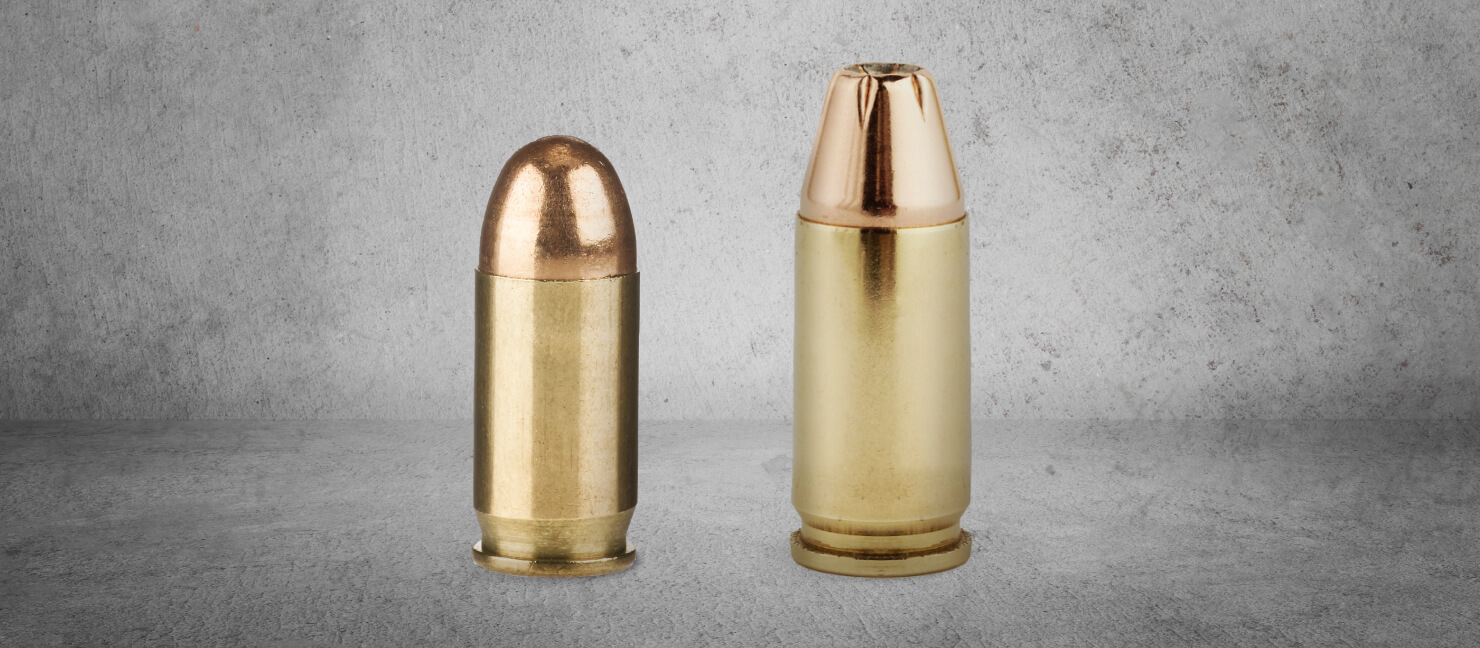
Recoil
The .380 ACP has lower recoil due to reduced power, which is particularly beneficial for shooters who have limited hand strength. This platform strikes a desirable balance between manageability, concealability, and performance.
The higher recoil of 9mm could impact shot placement during rapid fire and compromise stopping power. However, the felt recoil is lower in heavier 9mm gun models, which helps stabilize shooting and enhances comfort during prolonged use.
Usage
.380 ACP is popular among civilians for self-defense thanks to its firearm platforms with compact size and magazine capacity. Concealed carry with handguns using this round offers discretion without compromising self-defense. However, its lower energy makes it less common among American military.
9mm handguns are the standard among U.S. law enforcement agencies for their excellent balance of size, magazine capacity, and stopping power. Civilians also benefit from its stopping power and manageable recoil. Its availability in various compact pistol designs further enhances the appeal of concealed carry.
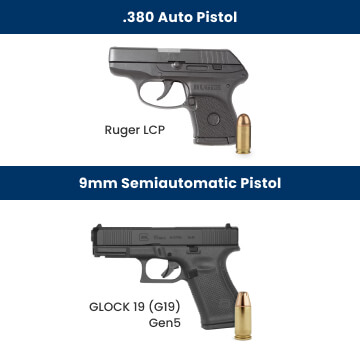
.380 vs 9mm: Pros and Cons
When choosing between the .380 ACP and the 9mm cartridges, it’s important to weigh their advantages and drawbacks. Below, we map out the pros and cons of both cartridges to help you decide which might fit your shooting needs.
.380 Pros
Easier control
Better concealability
Simple operation
.380 Cons
Lower impact
Higher ammo cost
Most effective at close-range
9mm Pros
Greater stopping power
Lower ammo cost
Wide applicability
9mm Cons
Harder recoil management
Less concealable
Potential over-penetration
Which One Should You Choose?
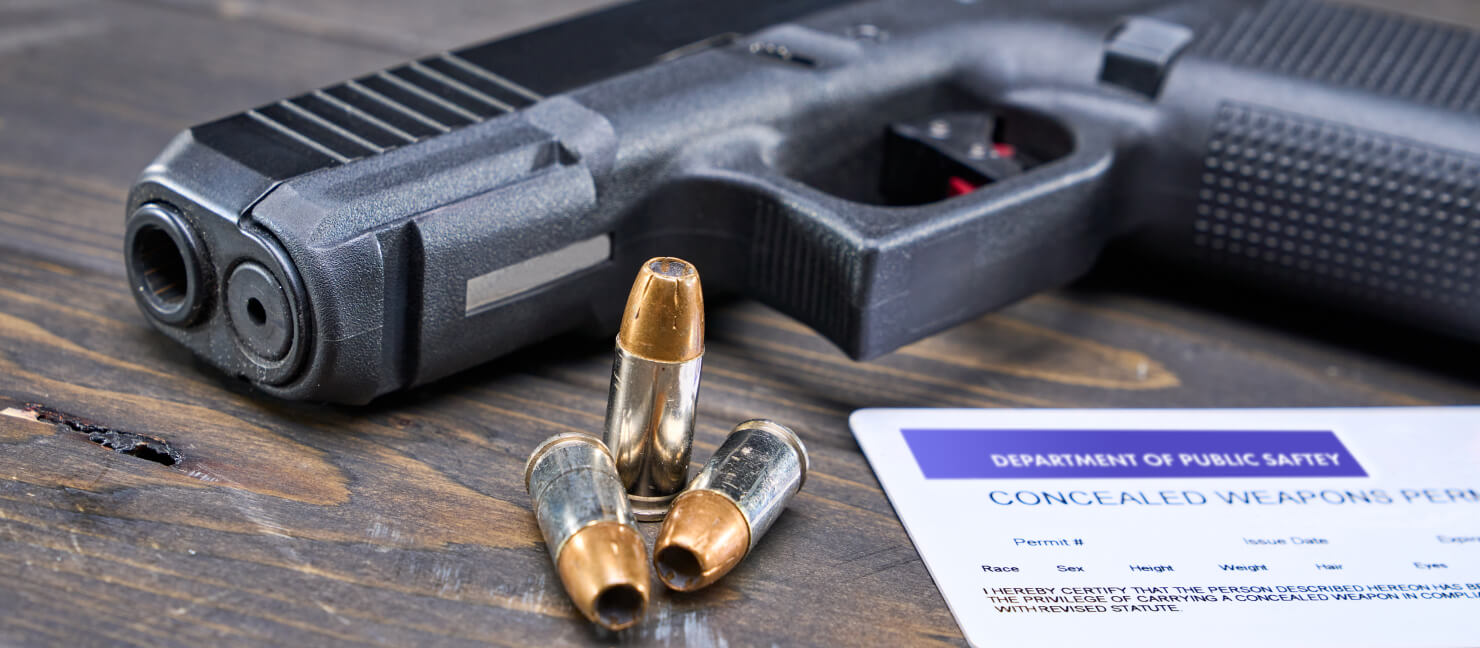
Choosing between the .380 ACP and the 9mm depends on your specific needs for concealability, recoil sensitivity, and intended use. Suppose you need a firearm that's easy to conceal and carry daily with minimal discomfort. In that case, the .380 ACP is an excellent choice for those new to shooting or sensitive to recoil. Its compact size and lower recoil make it ideal for shooters of all skill levels. If you need a firearm for everyday carry with minimal hassle and comfort, go for the .380 ACP.
The 9mm shines for its versatility, higher stopping power, and cost-effectiveness of ammo. It's preferred for law enforcement and those who can manage higher recoil for the benefit of increased firepower. The 9mm also provides a broader range of pistol options for those who prioritize performance and capacity. If you are open to mastering a bit more recoil, the 9mm is the recommended choice.
Have Fun Out There!
Still searching for the perfect ammo or firearm for your shooting needs? Dive into Academy Sports + Outdoors for our selection of .380 pistols and 9mm pistols and .380 ammo and 9mm ammo to go along with it. Whether you're stepping into the world of shooting or looking for the latest addition to your collection, Academy has the perfect pistol for you.


